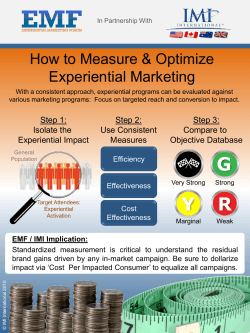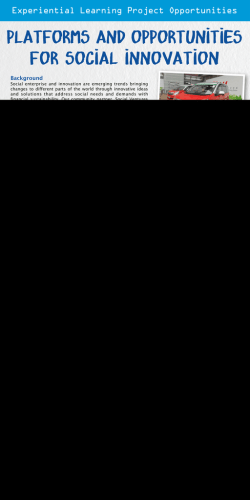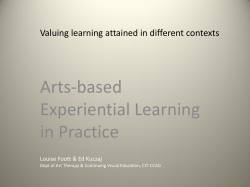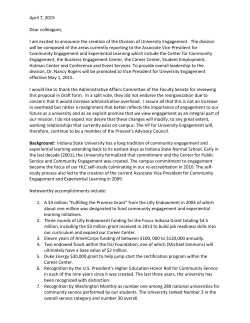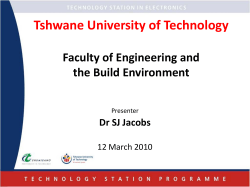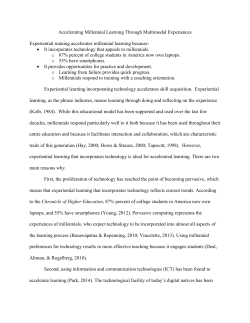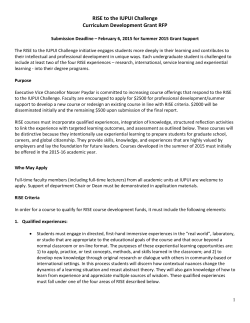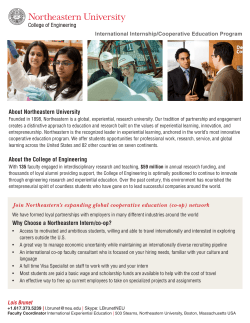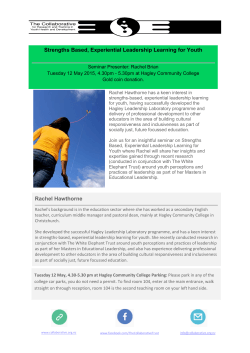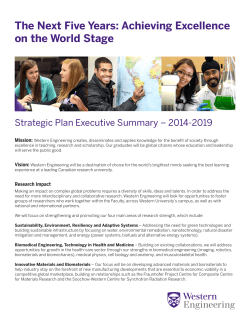
Proposal for a new university-wide Experiential Learning Requirement
EXPERIENTIAL LEARNING REQUIREMENT 1. Consideration of proposal Experiential Learning requirement to be submitted for consideration by University Curriculum Committee, March, 2015 2. Proposed Policy To succeed, students in the 21st century must be able to tackle real-world problems and use critical thinking and problem solving skills to solve multifaceted problems that do not have simple solutions. Thus, the University of Georgia will require all undergraduate students to engage in hands-on, experiential learning within a domestic or global setting as a graduation requirement. The university defines experiential learning as the development of knowledge, skills, abilities, values, behaviors, and attitudes via first-hand experiences outside of traditional classroom structures. Recognizing the diversity of academic programs across the university, the experiential learning requirement may be met in a variety of ways, including through the Center for Undergraduate Research Opportunities (CURO) and other supervised research courses; study-abroad and field school programs; service-learning; internships; and other unique credit or noncredit options. Each school and college will determine which courses and/or experiences will fulfill the requirement within its academic context, without increasing the hours required for graduation beyond the approved limit. Having once satisfied the Experiential Learning requirement, the student will not have to fulfill it again. A student in a major that requires experiential coursework may fulfill the Experiential Learning Requirement through his or her major program of study; if the student has fulfilled the requirement prior to declaring the major, the program of study for the major must still be completed. Each school and college will be responsible for monitoring the compliance of its students to the requirement. The Experiential Learning Requirement will be implemented as soon as all individual school and college plans are approved, no earlier than Fall, 2016. 3. Learning Outcomes for University-wide Experiential Learning Requirement Courses or extracurricular activities that fulfill the requirement should be structured and coordinated with the curriculum; hone the student’s understanding, attitude, behavior, confidence, and sense of responsibility; and challenge the student to engage reflectively with their academic experience. The following learning outcomes are anticipated through the various contexts of the Experiential Learning requirement A. Graduates who fulfill the requirement by doing undergraduate research will demonstrate and describe how systematic and in-depth inquiry into a problem contributes to the discovery or interpretation of knowledge significant to their field of study. B. Graduates who fulfill the requirement through study abroad or field school will interact with a culture and/or region distinct from their own and engage in academic inquiry and application afforded by the specific off-campus setting. C. Graduates who fulfill the requirement through service-learning will demonstrate the ability to identify a community need and strategies for addressing it through mutual learning, critical analysis, reflection, and collaboration with a community partner. D. Graduates who fulfill the requirement through an internship will have practiced skills or methods related to their field of study through supervised work in a professional or organizational setting. E. Graduates who fulfill the requirement through other approved experiences will have articulated, implemented, and reflected on a substantive application of their academic foundations to a real-world setting and/or challenge. 4. Process for school and college implementation plans A. Using the learning outcomes stated above, each school and college shall submit an implementation plan detailing how students will satisfy the experiential learning requirement. 1. When courses are used to satisfy the requirement, a list of the specific courses must be included in the implementation plan. 2. When extracurricular activities are used to satisfy the requirement, students will be required to provide a substantive written document reflecting on how their experiences fulfill the learning outcomes. This document must be reviewed and passed as satisfactory by the Experiential Learning Certification Officer for the unit (see below), or by an appropriate faculty member designated by the Certification Officer. B. Each school and college will designate a tenure-track faculty member who will function as the Experiential Learning Certification Officer and will have responsibility for certifying that students have satisfied the requirement prior to graduation. The student information system will facilitate documentation and certification of the fulfillment of the requirement at the time it is fulfilled, such that the record of completion will follow the student regardless of any subsequent change of major. C. Experiential Learning Certification Officers of schools and colleges shall have authority to approve exceptions for students who make a compelling case for having met the spirit of the requirement through means other than those specified in the school or college’s implementation plan. D. Proposals to establish or change implementation plans should be submitted by each undergraduate-serving school and college to the Office of the Senior Vice President for Academic Affairs and Provost for consideration by the University Curriculum Committee. The proposal will be sent to the University Curriculum Committee and reviewed by a standing subcommittee of the University Curriculum Committee. The subcommittee will evaluate the proposal to ensure that it conforms to the policy. The subcommittee will forward the proposal to the University Curriculum Committee for consideration. E. Affirmative recommendations of the University Curriculum Committee will be forwarded to the Senior Vice President for Academic Affairs and Provost for final review. F. All approved new or revised implementation plans will become effective subsequent to appearing in the Bulletin.
© Copyright 2026
